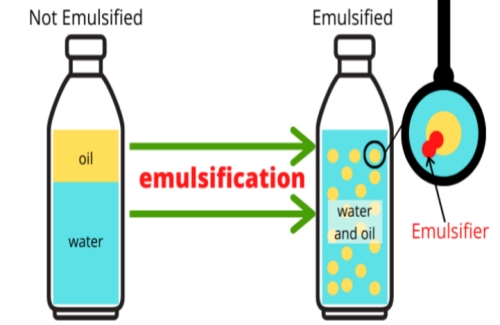How Emulsifier In Food Achieves Creamier Sauces and Dressings
Wiki Article
Everything about the Role of an Emulsifier in Food and Its Significance in Modern Cuisine
Emulsifiers are pivotal in contemporary cuisine, helping with the blend of immiscible fluids like oil and water. Their capacity to stabilize blends boosts the appearance and taste of various foodstuff. From salad dressings to baked items, emulsifiers play a significant function in both commercial and home food preparation. Yet, the science behind their feature and the future innovations in their use remain less explored. Emulsifier In Food. What extra could be uncovered regarding these important culinary representatives?Recognizing Emulsification: The Scientific Research Behind the Refine
Although emulsification may feel like an easy culinary technique, it includes intricate clinical principles that are crucial for developing steady mixtures of immiscible fluids, such as oil and water. At the heart of this process lies the principle of surface tension, which avoids the two liquids from mixing normally. Emulsifiers, compounds that decrease surface tension, play an essential role in promoting the mix of these fluids. They have both hydrophilic (water-attracting) and hydrophobic (water-repelling) residential properties, permitting them to secure themselves at the user interface between oil and water.When an emulsifier is presented and the mixture is perturbed, it develops a protective obstacle around distributed droplets of one fluid within the various other, supporting the mix. This action not only boosts structure and mouthfeel in food but likewise adds to their aesthetic appeal. Emulsifier In Food. Comprehending the science behind emulsification is essential in contemporary cuisine, permitting cooks to develop a variety of sauces, dressings, and emulsified meals
Typical Sorts Of Emulsifiers Used in Food
Emulsifiers are necessary components in the food market, playing a critical duty in stabilizing mixes of oil and water. Numerous kinds of emulsifiers are generally made use of, each with unique buildings matched for different applications. Lecithin, originated from soybeans or egg yolks, is one of the most preferred all-natural emulsifiers, typically discovered in chocolates and dressings. Mono- and diglycerides, which are derived from glycerol and fatty acids, are commonly made use of in baked products and margarine to boost appearance and extend rack life. An additional typical emulsifier is polysorbate 80, preferred for its capacity to boost the consistency of ice lotions and sauces. Furthermore, xanthan periodontal and guar gum work as thickening agents that additionally add to emulsification in gluten-free products. These emulsifiers are essential to producing a secure, tasty product in modern-day food formulas, making sure a pleasurable sensory experience for consumers.
The Function of Emulsifiers in Different Food Products
A range of foodstuff depend on emulsifiers to accomplish desired appearances and stability. These materials facilitate the mixing of immiscible fluids, such as oil and water, which is crucial in many refined foods. As an example, in salad dressings, emulsifiers assist maintain a constant mixture, protecting against separation and improving shelf life. In baked products, they add to an uniform crumb framework and dampness retention, boosting total high quality.Emulsifiers likewise play a considerable role in dairy products, such as gelato and yogurt, where they stabilize fat blobs, guaranteeing a smooth mouthfeel. In addition, in condiments and sauces, they improve thickness and improve spreadability. This performance is crucial in the manufacturing of delicious chocolates, margarine, and mayo, where a natural product is essential. On the whole, using emulsifiers in various foodstuff is integral to modern food production, improving stability and uniformity throughout a variety of items.
How Emulsifiers Enhance Texture and Taste

When integrated right into foodstuff, emulsifiers considerably improve both structure and flavor, creating an even more delightful eating experience. These substances help with the mixing of active ingredients that commonly do not mix well, such as oil and water, leading to a smoother, creamier consistency. This not just improves mouthfeel however likewise allows tastes to spread uniformly throughout the product, enhancing the general preference.

Emulsifiers in Home Cooking: Tips and Techniques
Just how can home chefs successfully make use of emulsifiers to improve their recipes? Emulsifiers play a vital function in accomplishing desirable textures and tastes in homemade dishes. Making use of egg yolks in mayo or hollandaise sauce allows for a stable have a peek at these guys solution, combining oil and water successfully. Home cooks can additionally explore mustard, which acts as an emulsifier in vinaigrettes, making sure a smooth consistency.In cooking, incorporating lecithin, located in pop over to this site egg yolks or soy, can enhance dough security and dampness retention. Additionally, utilizing business emulsifiers like xanthan gum or guar gum tissue can help enlarge sauces and dressings while keeping a luscious mouthfeel.
When developing ice creams or whipped toppings, emulsifiers can prevent ice crystal formation, leading to a smoother texture. By grasping these strategies, home chefs can substantially raise their cooking creations, giving satisfying and constant meals that display the power of emulsification.
The Future of Emulsifiers in Culinary Development
As the cooking world continues to evolve, the function of emulsifiers is positioned to come to be varied and progressively cutting-edge. Breakthroughs in food scientific research are leading to the development of new emulsifying representatives originated from natural sources, which cater to health-conscious consumers and enhance the sensory high qualities of recipes. Innovations such as plant-based emulsifiers are obtaining grip, permitting chefs to create vegan and allergen-free alternatives without jeopardizing texture or taste.In addition, using emulsifiers in molecular gastronomy is expanding, making it possible for cooks visit here to experiment with distinct structures and presentations that astound restaurants. As sustainability ends up being a priority, the future may see a change towards environmentally friendly emulsifiers that reduce environmental impact.
Inevitably, emulsifiers will certainly remain to play a crucial function in cooking advancement, connecting the space between practice and modernity, and enabling cooks to press the borders of creativity in their cooking areas.
Frequently Asked Inquiries

Are Emulsifiers Safe for Individuals With Allergic reactions?
Emulsifiers can be safe for people with allergic reactions, relying on their particular level of sensitivities. However, particular emulsifiers, stemmed from allergenic sources like soy or eggs, may cause reactions, requiring mindful ingredient scrutiny and appointment with healthcare specialists.How Do Emulsifiers Influence Food Rack Life?
Emulsifiers improve food rack life by stabilizing mixes, protecting against splitting up, and minimizing microbial growth. This stability assists preserve structure and taste with time, permitting products to stay enticing and safe for usage longer than without emulsifiers.Can Emulsifiers Be Derived From All-natural Resources?
Yes, emulsifiers can be originated from natural sources such as plants, eggs, and milk items (Emulsifier In Food). These all-natural emulsifiers help support mixtures, improving appearance and consistency in various food applications while being chosen for health-conscious customersWhat Are the Ecological Impacts of Emulsifier Production?
The ecological impacts of emulsifier manufacturing consist of source deficiency, habitat destruction, and pollution from synthetic processes. All-natural emulsifier sourcing can reduce some effects, yet on the whole, commercial methods still position substantial eco-friendly challenges to ecological communities worldwide.

Are There Vegan Emulsifiers Available in the marketplace?
Yes, there are a number of vegan emulsifiers readily available in the market, such as lecithin obtained from soy or sunflower, guar periodontal, and xanthan periodontal. These alternatives satisfy plant-based diet regimens without endangering emulsifying residential properties.Emulsifiers are important components in the food sector, playing an essential function in supporting mixtures of oil and water. A variety of food products depend on emulsifiers to accomplish preferred appearances and stability. When incorporated into food items, emulsifiers substantially boost both texture and flavor, producing an even more pleasurable consuming experience. Additionally, emulsifiers can stabilize air pockets in whipped products like mousses and lotions, leading to a light and airy structure. Emulsifiers enhance food shelf life by supporting blends, avoiding separation, and minimizing microbial growth.
Report this wiki page